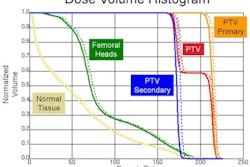The American Society for Radiation Oncology (ASTRO) has published a white paper on safely integrating intensity-modulated radiation therapy (IMRT) systems into radiation oncology departments.
The report, the first in a series that is part of ASTRO's Target Safely initiative, was published online July 15 in Practical Radiation Oncology. The recommendations in the report are intended to provide guidance to aid cancer treatment centers and radiation oncology departments in avoiding catastrophic errors, and to improve the safety and quality of care for patients receiving IMRT, ASTRO said. It focuses primarily on multileaf collimator-based delivery systems, as they are the most commonly used.
Among other guidance, lead author Jean Moran, PhD, associate professor and associate division director for clinical physics at the University of Michigan Medical Center, and fellow members of ASTRO's White Paper Task Group, recommended that "forced time-outs" be implemented to ensure adequate time to perform reviews and quality assurance at key points.
Radiation oncology clinicians and staff also need to acknowledge that treatment initiation may need to be delayed to allow time for quality assurance checks and investigations of problems when they are discovered, the task group wrote.
The report also includes a list of possible improvements including:
- Methods to directly and independently verify or validate patient plan and treatment data on the treatment machine prior, during, and after radiation delivery
- Providing safety measures in the IMRT workflow
- Integrating IMRT subsystems and quality assurance procedures



















